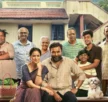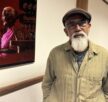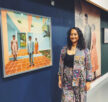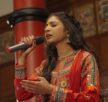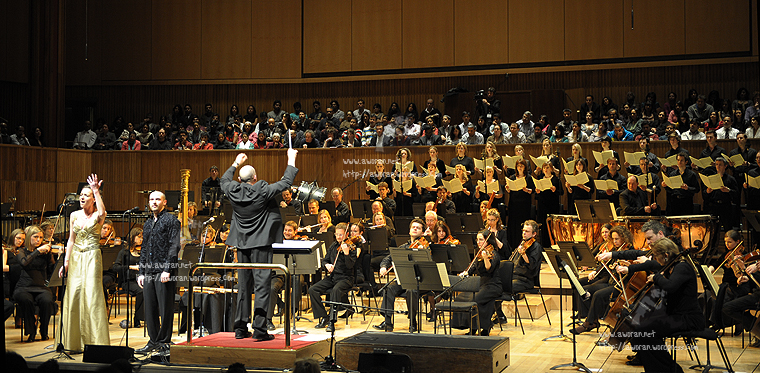

AR Rahman’s Alchemy
The Alchemy festival opened to a full house of AR Rahman fans at the prestigious Royal Festival Hall, at London’s Southbank Centre. The artistic director of Southbank, Jude Kelly, alongside longtime AR Rahman collaborator, the orchestrator/conductor Matt Dunkley (famous for his work in movies like Iron Man, Couples retreat & The Dark Knight) came together, for this highly anticipated concert which proved to be a rousing success.
The evening was a combination of one of the world’s finest orchestras, the London Philharmonic, the excellent Metro voices choir, flute player Naveen Kumar, who worked with AR Rahman from his Roja days, Asad Khan, the scion of the Hindustani Mewati Gharana, on the sitar, Alma Ferovic, the Bosnian-born singer whose voice simply takes one’s breath away, Eddie Hession on the accordion, Michael Rouse with his soaring vocals and the beautiful Kathak exponent, Gauri Sharma Tripathi, who not only performed to the haunting Bombay theme, but her many students also adorned the Royal Festival Hall like sparkling jewels.
The concert featured specially chosen music from AR Rahman’s 600 odd film scores, which have transcended Indian and Far Eastern cinema as well as Hollywood. Rahman sat amongst the audience, watching his scores (some quite rare) coming alive on stage. After the music did the talking, AR Rahman was presented with a Gold disk from Universal records, for Slumdog Millionaire, to add to his treasure trove of trophies, while he was indeed in high spirits, as BBC Radio One DJ Nihal took audience questions during a short Q&A, which garnered some witty and interesting answers.
The UK’s Telegraph said of the show: “I was touched by Rahman’s ability to conjure a wonderful radiant melody. There’s a special quality in those sinuous tunes, a kind of primal innocence, that would melt even the sternest sceptic.”
The UK’s Times describes: “The guest sitar player Asad Khan injecting passion into the fusion of classical Indian textures and brasher Western pop figures. The flautist Naveen Kumar added another layer of much-needed local colour during his cameo appearances.”
AR Rahman also spoke to the widely read morning paper, Metro: “It’s such a joy to do this because we don’t have a fully fledged symphony orchestra in India. That’s actually what we’re trying to create – I’ve started a school of classical music in Chennai [Rahman’s birthplace]. I bring all the worldwide experience that I’ve learned back to India because that’s where all the love and support for my music started.”
The editor in chief of Thamarai wrote the published programme notes for the show and has been allowed to exclusively share them with our readers, alongside some exclusive photos, both from the rehearsals and the show itself, by Akin ‘Aworan’ Falope.
Chennai-born composer AR Rahman has won at the Baftas, Academy Awards and Grammys; his sublime music has captivated millions of fans around the world; and those who know him say that even more than the music is the man himself – his benevolence and magnanimity, which seems to be part of the magical musical equation he has created.
AR Rahman started out as a session musician and then made his name composing for Bollywood films, but his music transcends time and place. Tonight’s concert, featuring the London Philharmonic, takes in works composed for the silver-screen in Hollywood, India and even China, transporting the audience from Elizabethan England to modern-day Mumbai.
AR Rahman’s first work writing for cinema was for stalwart director Mani Ratnam’s film Roja (The Rose) back in 1992. The quality of soundscapes created by AR Rahman and his late sound engineer, H Sridhar, saw Time magazine name Roja’s soundtrack as one of the ten best of all time in 2005. ‘The Cry of the Rose’ is a resplendent combination of the fiery and patriotic ‘Thamizha Thamizha’, which was sung by Hariharan in the film, seguing into the soothing waves of ‘Kadhal Rojave/Roja Jaaneman’.
Mani Ratnam created Roja as part of a trilogy and the other two films, Bombay and Dil Se/Uyire, were equally lauded, especially for their music. One of AR Rahman’s most important and biggest selling pieces of music was indeed the ‘Bombay theme’, which is performed this evening by Naveen Kumar, the Mumbai-based flautist who has played for AR Rahman since Roja. The flute here is key, in this piece and it lingers gracefully over the piece when the strings come in a laminiferous esoteric fashion.
AR Rahman joined forces with Craig Armstrong to compose the score for Shekar Kapur’s 2007 film Elizabeth: The Golden Age, after which its star, Cate Blanchett, had become a fan of AR Rahman’s music. The score takes the audience into the world of yesteryear with its captivating music, which blends sounds of the West with those from the East.
The ‘Divinity theme’ strikes a chord in the music lover’s heart, for its subtle evocative use Indian instruments, which intertwine beautifully with lush strings. Tonight’s performance is accompanied by Gauri Sharma Tripathi and dancers, a project that came about after Tripathi was introduced to AR Rahman by the acclaimed singer Reena Bharadwaj. Two other excerpts from the film, ‘The dark depths of Battle’ and ‘Mary’s beheading’ take the audience to another dimension with their haunting strains.
Another collaboration with Shekar Kapur was Swarovski’s Passage, a short film featuring Julia Stiles, Lily Cole and Haley Bennet as three sisters. Rahman’s score for the film echoes the romantic nature of the story, taking the audience on a journey ending in epiphany for listeners that mirrors that of the film’s characters.
Warriors of Heaven & Earth, the Chinese movie that AR Rahman scored, brings an interesting mix of music that showcases his versatility as a composer. While appealing to the sensibilities of the Chinese audience, he brings in layers of stunning sounds and thus, the emotions that go with them. ‘Desert Storm’ and are technically complex, while Horses is bright and spectacular, with a touch of the Indian Raags (modes) AR Rahman is so good at entwining with melodies.
MF Hussain’s 2004 film Meenaxi: A Tale of Three Cities, was not just a vision in cinema, but its tapestry was woven with the rainbow colours of AR Rahman’s music bringing to life the three cities mentioned in the title: Hyderabad, Jaisalmer and Prague. The soundtrack is recognised as one of AR Rahman’s best and tonight three dazzling musical pieces from the film, ‘We will fly’, ‘One way’ and ‘Who are you?’ are presented in full fervor.
Ashutosh Gowariker, is yet another Indian director who has turned to AR Rahman to create background depth with his music and his the familiar sounds of the theme of the Oscar-nominated Lagaan will linger in the hearts of music lovers forever. Presented in its full glory this evening, this piece leaves the listener mesmerised. Similarly evocative is the theme music of Swades, the Shahrukh Khan film that brought a sense of patriotism to India and those of the diaspora.
For The Rising: Ballad of Mangal Pandey, AR Rahman had to compose a score that reached back into India’s past. The depiction of The Sepoy Mutiny, the rebellion of 1857, is brought to life in music that juxtaposes Indian instruments with the occidental.
Another period film, which had a fine musical basis, is Netaji Subhas Chandra Bose: The Forgotten Hero – whose story was made into film by one of India’s decorated film-makers, Shyam Benegal. Its première at the London film festival had people talking about the complexity of the music and the somewhat baroque nature of certain parts of the score — how befitting for a subject that was, for the most part, hidden from history.
Works from two of AR Rahman’s forays into musical theatre features tonight. The first was the immensely successful Bombay Dreams, which was produced by Andrew Lloyd Webber.
AR Rahman’s music for Bombay Derams stemmed from a selection of his Indian cinematic scores, popular numbers which came to life when sung by a London cast to great appreciation, making history as the first Indian-themed stage musical.
Songs like ‘Only love’, which translate the Indian Raag Sivaranjani into a fully fledged theatre ensemble piece and the blissful ‘Closer than ever’ (‘Nahi Saamne/Kalaimaane’ from Taal).
The second musical was The Lord of the Rings, which premièred at Toronto’s Broadway and then had a run at London’s Theatre Royal, in Drury Lane. Working in conjunction with the Finnish group, Värttinä, the exposition of tracks like ‘Lothlóren’ and ‘The final battle’ bring about powerful feelings of elation.
It was in 2009 that AR Rahman, a man who has risen from being a session pianist, arranger and producer for many of India’s finest, became a global musical icon.
Danny Boyle’s Slumdog Millionaire, a film that was made in 2008 and almost ended up being released straight to DVD but ended up capturing the hearts of cinema goers the world over, winning nearly every major award and earning its place in musical history, as well as Oscars for AR Rahman, sound designer Resul Pookutty and director Danny Boyle, among others.
The success of Slumdog Millionaire and its music went far and wide, with the song ‘Jai Ho’ being re-mixed by the popular girl group, Pussycat Dolls and the song being featured in many different platforms. Indeed, the runaway success also meant that young Sitarist Asad, who performed on the track ‘Mausam & Escape’, has toured the world, playing as far as Australia.
Latika, the name of the film’s heroine, had a sweet theme dedicated to her – this simple yet memorable melody reigns in the hearts of AR Rahman fans perpetually.
Demonstrating the breadth of his talent, AR Rahman then took on composing duties for Couples Retreat, a Hollywood romantic comedy. This saw AR Rahman making his home in Los Angeles and bringing out music that was quite different from his previous ventures.
The film became a worldwide box office success and a number 1 hit in the US. While the music ranged from the popular number ‘Nana’, which featured AR Rahman’s young son, Ameen, and the mellifluous song ‘Sajna’, today’s selection come in the form of the ‘Jason & Cynthia’ theme (in which a touch of Sajna floats), ‘Itinerary and Intervention’. Again, Rahman mixes instruments, gelling eclectic sounds together creating a memorable soundtrack.
Ever humble, if one asks AR Rahman about the pinnacle of his career, he always points out that the important thing for him is the journey, not the destination. His ability to compose, produce, sing and most of all, pull in talents far and wide make him one of the most interesting musical talents in the world today. Like in the story of Slumdog Millionaire, for AR Rahman, music is written.
Words: Ashanti OMkar © Thamarai – Please DO NOT reproduce without express written permission – this text is copyrighted.
Special Thanks: Jennifer Whitehead, Anne-Marie O’Sullivan, Simon Long, Vijay Iyer, Gopal Srinivasan, Akin Aworan
Photo: Akin Aworan
- Previous Post
AR Rahman’s Concert for peace in Sydney











